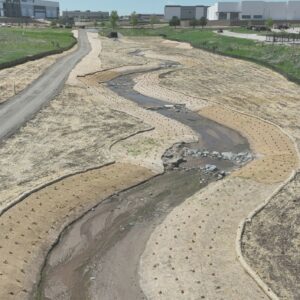Cherry Creek Watershed: A Model of the One Water Concept in Action
RESPEC is committed to advancing One Water sustainable water management practices, and nowhere is this more evident than in our work within the Cherry Creek Watershed.
The One Water concept guides our approach and is a holistic framework for managing all forms of water—drinking water, wastewater, stormwater, or groundwater—as a single, integrated resource. This approach focuses on breaking down silos and fostering collaboration across agencies and communities to address water challenges collectively. By viewing water as one interconnected system, One Water aims to create sustainable, resilient solutions that enhance water quality, optimize resource use, and support environmental health.
Located southeast of Denver, the Cherry Creek Watershed spans 440 square miles, crossing 4 counties, 10 municipalities, and multiple water and wastewater districts and authorities. This watershed exemplifies the One Water concept by integrating drinking water, wastewater, stormwater, and water rights management into a unified strategy. Alan Leak, RESPEC’s National Water Resources Practice Lead, has successfully implemented One Water strategies in Cherry Creek.
His work began in the 1980s with projects like the Lone Tree Creek Detention Pond L3, designed to manage stormwater by reducing channel sizes and construction costs. “By constructing a detention pond here with water quality enhancement features, we reduced the downstream channel size by half, provided additional land for the Arapahoe County Water and Wastewater Authority’s (ACWWA’s) Wastewater Treatment Facility expansion, improved water quality, and cut overall costs while maintaining effective stormwater management,” Leak explains. This project was the first step in a broader strategy to address flood risks and improve water quality in a fast-developing area.
RESPEC’s role in the watershed has since expanded significantly. One major undertaking was the Cherry Creek Watershed Model, a comprehensive tool that tracks water quality and quantity throughout the 386-square-mile area upstream of Cherry Creek Reservoir. The model simulates various scenarios, including projected development, climate change impacts, and pollutant loading, to support the Cherry Creek Basin Water Quality Authority’s goal of maintaining Cherry Creek Reservoir health. This model has helped pinpoint specific sources of pollutants and evaluate the effectiveness of numerous pollutant reduction facilities within the watershed. As a result, targeted efforts to reduce nutrient loading have been prioritized, directly enhancing the water quality in Cherry Creek and Cherry Creek Reservoir, an essential State Park and recreational resource. Improved water quality in Cherry Creek (and the Cherry Creek alluvium) also provides better water quality for municipal irrigation and treated potable water for ACWWA, also one of RESPEC’s clients.
Another notable project is the Dove Creek Stream Improvement Project, which aimed to restore 2,500 feet of degraded streambed. The project involved constructing outfall structures, forebays, and riffle drop structures to control erosion, improve habitat, and increase the area’s flood resilience. These efforts have protected water quality and bolstered the local ecosystem by restoring natural stream function and enhancing habitat for native species.
Flood management has also been a focal point of RESPEC’s work within the watershed. For example, the Inverness Regional Detention Pond project involved constructing a multiuse facility supporting flood control and enhancing water quality. The pond’s design integrates regulated flood storage and provides a managed release of stormwater, reducing peak flows and protecting downstream areas from potential flooding events. Projects like these demonstrate the One Water approach’s emphasis on creating multifunctional infrastructure that meets diverse community needs.
One of the core principles of the One Water approach is that right-sized solutions are achieved through partnerships. Leak explains, “RESPEC partners with various stakeholders—including the Southeast Metro Stormwater Authority, the Cherry Creek Basin Water Quality Authority, and the Mile High Flood District—so that we’re working together to maximize environmental benefits and streamline costs.”
Collaborations with these organizations have enabled RESPEC to implement stormwater solutions that support the entire watershed’s water quality and flood resilience. Additionally, RESPEC has engaged in regulatory support through Municipal Separate Storm Sewer System (MS4) program assistance, helping local entities monitor, permit, and comply.
Reflecting on the interconnected nature of these projects, Leak emphasizes that each contributes to a sustainable future for the Denver metro area.
“We’re not just managing water; we’re building a system that’s prepared for the challenges ahead,” he notes. By embracing the One Water framework, RESPEC continues to lead the creation of resilient water solutions that benefit the communities we serve.



Stay in Touch